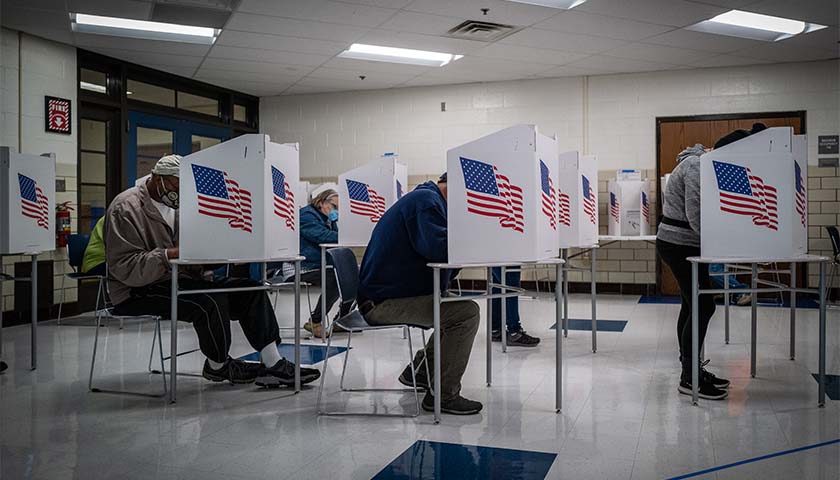by Natalia Mittelstadt
County election boards in swing states across the country are engaged in legal battles over election certification ahead of the November elections, while others were threatened with legal action if they didn’t certify election results.
With the presidential election less than five months away, county election board members are either initiating or find themselves the subject of legal actions over the certification of elections. That process occurs before the state can certify election results.
The central issue is whether election boards must certify election results or if they have discretion over certification, with Democrats largely favoring the former option and Republicans believing the latter.
Last month, Julie Adams, a Republican member of the Fulton County Board of Registration and Elections (BRE), filed a lawsuit against the county, board, and election director, in which she claimed Fulton County Elections Director Nadine Williams prevented her from accessing information and performing her duties. The lawsuit was filed before Adams abstained from certifying the May 21 primary election in Fulton County on May 28.
The Democratic Party of Georgia sent a letter to the BRE members “asserting that certification is a ministerial duty, and the failure to vote in favor of certification is subject to potential legal action, including but not limited to possible criminal sanctions,” according to the suit.
The complaint asks the court “to clarify that the statutory role of election superintendent assigned to the BRE by Georgia law cannot be delegated in its entirety to the Director” and that Adams’ “duties are, in fact, discretionary, not ministerial, and that the Director may not prevent BRE from gaining access to information needed to fulfill their statutory duties.”
The America First Policy Institute (AFPI), which is assisting Adams with her legal action, said in an announcement regarding the case that it seeks to “re-establish the role of Board members as the ultimate parties responsible for ensuring elections in Fulton County are free from fraud, deceit, and abuse.”
Ken Blackwell, AFPI Chair of the Center for Election Integrity and former Ohio secretary of state, said in a statement, “Something everyone should agree on is that it should be easy to vote and hard to cheat.
“In Georgia, the Legislature has designated Board members like Julie Adams with ensuring the integrity of Fulton County’s elections. If Board members cannot have access to the information they need, then Georgians run the risk of having their hard won right to vote diluted by unlawfully cast ballots,” he added.
Also last month, Delta County Board of Canvassers in Michigan deadlocked in a 2-2 vote on certifying the May 7th recall election results. Three Republican commissioners on the board faced recall elections and lost by about 3-1 margins after they voted to fire the county administrator in February 2023.
The Republican commissioners initially refused to certify the results of the recall election because of the similarity of the vote totals across the three races. After delaying certification, the state elections director sent the board a letter, noting that state law required them to certify the election results. The board then certified the election results.
Last November, Michigan enacted a law to clarify that local canvassing boards must certify election results.
Following the delay in election certification, Michigan state officials Secretary of State Jocelyn Benson (D) and Attorney General Dana Nessel (D) reminded local canvassing boards “of their ministerial duty to certify election results.” The Democratic officials noted that the Delta County board had been warned of the legal consequences they could face if they didn’t certify the election results, including a misdemeanor charge of Willful Neglect of Duty.
The state’s crackdown on canvassing boards came after 2020, where one Republican on Michigan’s state board of canvassers abstained from voting to certify the presidential election over his concerns of election issues in Detroit. The board member’s concerns came after Republicans on the Wayne County elections board had initially decided to not certify the presidential election results before reversing course.
There were also issues with election certification in 2022.
Following the 2022 midterm elections, Mohave County voted unanimously to certify the election after initially delaying certification. However, two of the supervisors on the county board did so “under duress” the board’s legal counsel said that the county’s election would be invalidated, which could result in a misdemeanor charge of malfeasance of office by county officials.
Some county officials have been challenged in court for delaying certification of election results.
Two Republican Cochise County supervisors were indicted by a grand jury last year that was convened by Arizona Attorney General Kris Mayes (D) after they had delayed certification of the 2022 midterm election results. The two supervisors voted to delay the election certification because they wanted to ensure that the voter tabulation machines were certified for accuracy.
However, before the supervisors were able to have another meeting regarding the machines, then-Secretary of State Katie Hobbs (D) sued and got a court order for the supervisors to certify the election. The election was certified four days before the statewide canvass deadline.
That case is still ongoing in a Maricopa County state court.
– – –
Natalia Mittelstadt is a reporter for Just the News.
Photo “Voting Booths” by Phil Roeder. CC BY 2.0.





